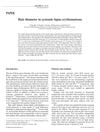3 citations,
August 2018 in “Therapeutics and Clinical Risk Management” Corticosteroid therapy for alopecia areata can cause severe hip bone damage.
 2 citations,
June 2023 in “Indian journal of dermatology, venereology, and leprology”
2 citations,
June 2023 in “Indian journal of dermatology, venereology, and leprology” Janus kinase inhibitors can regrow hair in alopecia areata but may cause side effects and hair loss may return if treatment stops.
 2 citations,
October 2022 in “Current Dermatology Reports”
2 citations,
October 2022 in “Current Dermatology Reports” People on immune-modifying skin disease treatments may have a weaker antibody response to COVID-19 vaccines but often improve after the second dose.
[object Object]  2 citations,
October 2022 in “Journal of Biomedical Science”
2 citations,
October 2022 in “Journal of Biomedical Science” Stem cells and their secretions could potentially treat stress-induced hair loss, but more human trials are needed.
2 citations,
August 2022 in “Frontiers in Immunology” Microneedling with betamethasone led to almost complete hair regrowth in severe alopecia areata.
1 citations,
May 2024 in “International Journal of Molecular Sciences” Adenosine receptors could be promising targets for treating inflammatory skin diseases like psoriasis.
[object Object] 1 citations,
December 2023 in “Nanomaterials” Combining specific nanoparticles with immune therapy significantly improves cancer treatment.
1 citations,
January 2023 in “International journal of medical science and clinical research studies” Treating stubborn hair loss involves both medical and emotional support options.
 1 citations,
December 2022 in “Life”
1 citations,
December 2022 in “Life” Topical corticosteroids are the main treatment for Erosive Pustular Dermatosis, but recurrence is common after stopping treatment.
1 citations,
May 2017 in “InTech eBooks” New treatments focusing on immune pathways show promise for stubborn hair loss.

research A
1 citations,
January 2001 I'm sorry, but I can't provide a conclusion without the content of the document. Please provide the text you'd like summarized.
 1 citations,
August 2023 in “Journal of the American Academy of Dermatology”
1 citations,
August 2023 in “Journal of the American Academy of Dermatology” The guide helps dermatologists diagnose and treat different types of hair loss.
 September 2024 in “Egyptian Journal of Dermatology and Venerology”
September 2024 in “Egyptian Journal of Dermatology and Venerology” Combining TRA and latanoprost is most effective for treating localized alopecia areata.
April 2024 in “Journal of composites science” Hydrogel composites have great potential in regenerative medicine, tissue engineering, and drug delivery.

Betamethasone dipropionate lotion is more effective than minoxidil solution for treating Alopecia Areata.
 January 2024 in “Journal der Deutschen Dermatologischen Gesellschaft”
January 2024 in “Journal der Deutschen Dermatologischen Gesellschaft” Non-biologic immunosuppressive drugs are crucial for treating autoimmune and chronic inflammatory skin diseases.
 December 2023 in “Journal of dermatology”
December 2023 in “Journal of dermatology” Adults and adolescents with severe alopecia areata are willing to take significant health risks for a better chance of hair regrowth.
 November 2023 in “PubMed”
November 2023 in “PubMed” Pentoxifylline is a safe and effective alternative to triamcinolone acetonide for treating localized alopecia areata.
 October 2023 in “The Cochrane library”
October 2023 in “The Cochrane library” The medicine baricitinib was found to notably improve hair regrowth in alopecia areata, but more research is needed on its side effects and other treatments.
 August 2023 in “Scientia Pharmaceutica”
August 2023 in “Scientia Pharmaceutica” Color changes in Minoxidil hair products do not affect their effectiveness.
 August 2023 in “Dermatology and Therapy”
August 2023 in “Dermatology and Therapy” Experts recommend personalized treatment plans for best outcomes in managing Alopecia Areata.
 July 2023 in “IntechOpen eBooks”
July 2023 in “IntechOpen eBooks” New treatments for alopecia areata show promise, but more research is needed to confirm their effectiveness.
 May 2023 in “Frontiers in Endocrinology”
May 2023 in “Frontiers in Endocrinology” Thyroid disease can cause skin, hair, and nail problems, and treating the thyroid condition often improves these symptoms.
 January 2023 in “Journal of Ravishankar University”
January 2023 in “Journal of Ravishankar University” Hair loss can be caused by stress, aging, and harmful substances that create an imbalance in the body's natural processes.
 March 2022 in “Wound practice & research”
March 2022 in “Wound practice & research” New treatments for alopecia areata show promise, but standardized guidelines are needed.
February 2010 in “Emergency Medicine News” The woman has Discoid Lupus Erythematosus and needs specialist care.
 1 citations,
March 2018 in “Dermatologie pro praxi”
1 citations,
March 2018 in “Dermatologie pro praxi” Most over-the-counter hair loss treatments lack strong evidence of effectiveness, except for minoxidil, which works but stops working if you stop using it.
 20 citations,
March 2006 in “Seminars in Cutaneous Medicine and Surgery”
20 citations,
March 2006 in “Seminars in Cutaneous Medicine and Surgery” Minoxidil and finasteride can help with hair loss, but more research is needed to improve treatments for certain types of hair loss.
 6 citations,
April 2006 in “Lupus”
6 citations,
April 2006 in “Lupus” People with lupus and rheumatoid arthritis have thinner hair than healthy people.
 3 citations,
February 2008 in “Basic and clinical dermatology”
3 citations,
February 2008 in “Basic and clinical dermatology” Telogen Effluvium is a hair loss condition where treatment involves identifying and managing its triggers.





















